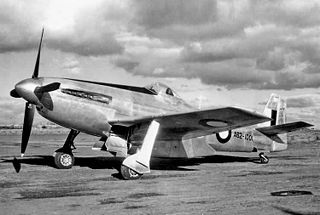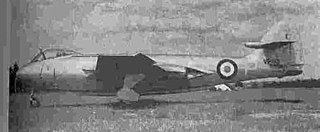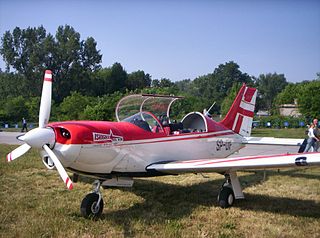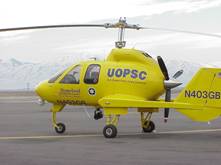| Grob G 140TP | |
|---|---|
 | |
| Role | Trainer |
| National origin | Germany |
| Manufacturer | Grob Aircraft |
| First flight | 12 December 2002 |
| Status | Active in production |
| Produced | 2003-present |
The Grob G140TP is a four-seat light aircraft built by Grob Aircraft.
| Grob G 140TP | |
|---|---|
 | |
| Role | Trainer |
| National origin | Germany |
| Manufacturer | Grob Aircraft |
| First flight | 12 December 2002 |
| Status | Active in production |
| Produced | 2003-present |
The Grob G140TP is a four-seat light aircraft built by Grob Aircraft.
The aircraft was presented at the Paris Air Show in 2001 and completed its maiden flight on December 12, 2002. Powered by a Rolls-Royce 250-B17F turboprop engine, the Grob G 140TP is fully aerobatic capable. So far, Grob Aircraft has not decided to resume construction of the G 140. The coarse G 140TP could have been certified in the utility and aerobatic classes, with the utility version being used as a reconnaissance aircraft. [1]
Data from [2]
General characteristics
Performance

The Valmet L-90 Redigo is a turboprop-powered military basic trainer aircraft and liaison aircraft, a development of Valmet's earlier training aircraft for the Finnish Air Force. The L-90 was the last military aircraft designed and produced in Finland.

Grob Aircraft, formerly Grob Aerospace, is a German aircraft manufacturer, specialising in gliders and general aviation.

The CAC CA-15, also known unofficially as the CAC Kangaroo, was an Australian propeller-driven fighter aircraft designed by the Commonwealth Aircraft Corporation (CAC) during World War II. Due to protracted development, the project was not completed until after the war, and was cancelled after flight testing, when the advent of jet aircraft was imminent.

The GippsAero GA8 Airvan 8 is a single-engined utility aircraft manufactured by GippsAero of Victoria, Australia. It can seat up to eight people, including the pilot.

The Hawker P.1072 was a 1949 experimental British aircraft acting as a test bed for the Armstrong Siddeley Snarler rocket booster engine. It was the prototype Hawker Sea Hawk modified to install the rocket in the tail.

The Grumman Gulfstream I is a twin-turboprop business aircraft. It first flew on August 14, 1958.

The Grob G 120 is a two-seat training and aerobatic low-wing aircraft with a carbon composite airframe, built by Grob Aircraft. It is based on the Grob G 115TA training aircraft and is specially designed for military and civil pilots training. It has a tricycle landing gear and a low tailplane.

The Allison Model 250, now known as the Rolls-Royce M250, is a highly successful turboshaft engine family, originally developed by the Allison Engine Company in the early 1960s. The Model 250 has been produced by Rolls-Royce since it acquired Allison in 1995.

PZL M26 Iskierka or M26 Airwolf is a Polish trainer and aerobatic aircraft, designed at WSK PZL-Mielec.

The G103 Twin II is a high-performance two-seat sailplane manufactured in Germany by Grob Aircraft. The aircraft is of T-tail configuration, and is fitted with upper-surface airbrakes and a non-retractable undercarriage. Of fiberglass construction, it is designed for training, high performance cross-country racing and simple aerobatic flying.

The Cierva W.11 Air Horse was a helicopter developed by the Cierva Autogiro Company in the United Kingdom during the mid-1940s. The largest helicopter in the world at the time of its debut, the Air Horse was unusual for using three rotors mounted on outriggers, and driven by a single engine mounted inside the fuselage.

The Avro 701 Athena is a British advanced trainer aircraft built by Avro in the late 1940s. It was designed to replace the North American Harvard in the Royal Air Force, but was bought only in small numbers, the competing Boulton Paul Balliol being preferred.

The AS/SA 202 Bravo is a two to three-seat civil light aircraft jointly designed and manufactured by the Swiss company Flug- und Fahrzeugwerke Altenrhein (FFA) and the Italian company Savoia-Marchetti. The aircraft was designated the AS 202 in Switzerland, and the SA 202 in Italy.

The HESA Shahed 278 is an Iranian-made light utility helicopter.
The Schweizer RU-38 Twin Condor is a two or three-seat, fixed gear, low wing, twin boom covert reconnaissance aircraft.

The GippsAero GA10 Airvan, marketed as the Airvan 10, is a 10-seat, turbo prop, single-engined utility aircraft currently being developed by GippsAero of Victoria, Australia.

The Groen Hawk 4 was a single engine, pusher configuration, four seat autogyro built in the United States in the late 1990s. Three prototypes, two piston engined and one turboprop powered, were flown but the Hawk did not go into production.

The Grob G 120TP is a two-seat turboprop training and aerobatic low-wing aircraft with a composite airframe, built by Grob Aircraft. It is based on the Grob G 120A training aircraft and has been developed for military and civil pilots training. It has a retractable tricycle landing gear and a low tailplane.

The Diamond DART is a series of tandem, two-seat civilian and military turboprop trainers manufactured by Austrian Diamond Aircraft, "DART" meaning Diamond Aircraft Reconnaissance Trainer.
The Grob G 110 was a single-engined two-seat light aircraft, made mainly of glassfibre, that was designed and built by the German manufacturer Grob Aircraft in the early 1980s. Two prototypes were built, with the first example making its maiden flight on 6 February 1982, but development was abandoned after the first prototype crashed later that year.